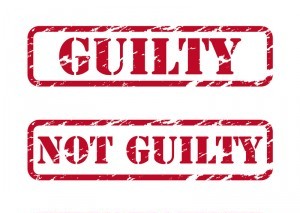Judge's omission of the word 'not' leads to reversal of sex-crime conviction

Image from Shutterstock.
A judge’s one-word mistake deprived a defendant of his right to an impartial jury and the presumption of innocence, a federal appeals court has ruled.
The Los Angeles judge erred during the December 2006 voir dire in the sex-crime trial of Bryant Keith Williams, according to the San Francisco-based 9th U.S. Circuit Court of Appeals. The judge said Williams had pleaded guilty to the charges, though he intended to say Williams had pleaded not guilty. Trial Insider and Courthouse News Service have stories.
The judge’s error came to light when jurors who had been deliberating for less than an hour sent the judge a note. “As a group,” the note read, “we the jury feel we heard the judge state the defendant pleaded guilty before the trial. Is this true?”
The judge reviewed the transcript, admitted the mistake and admonished jurors that he had no special knowledge of Williams’ guilt or innocence. He asked jurors if they were able to set aside the misstatement and be fair, and whether the misstatement caused them not to pay attention.
The jurors remained silent, but one was later excused after writing a note to the judge confessing to believing the defendant to be guilty throughout the trial. “I saw everything through that lens,” the juror said. The judge again questioned the remaining jurors, and all said they could be fair.
Williams was convicted of false imprisonment and forcible sexual penetration by a foreign object. He was sentenced to 50 years to life in prison.
Despite the judge’s efforts to correct the error, the 9th Circuit said Williams must be released or retried as a result of the error. “Viewed in the context of the trial as a whole,” the 9th Circuit said in the 2-1 opinion (PDF), “the judge’s initial misstatement and his ineffective attempts to cure it were devastating to Williams.”
The appeals court said that before polling the jurors a second time, the judge had said the dismissed juror was “not a fair juror.” The judge also said jurors are supposed to be fair and impartial throughout the entire trial. “The implication was clear,” the 9th Circuit said. “Any juror who questioned her ability to disregard the judge’s misstatement was ‘not fair.’ ”
Hat tip to How Appealing.



